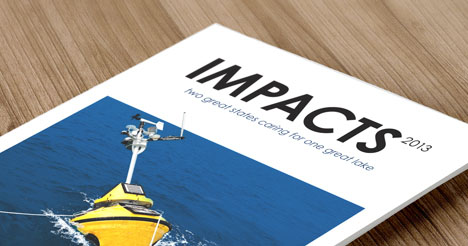Category:
In the news: Appeals court ruling opens door for manufacturer-funded medicine take-back programs
October 1st, 2014 by iisg_superadminTake a minute to learn about pollution prevention
September 11th, 2014 by iisg_superadminIf you only had a minute, what would you say?
Over 12,000 pounds of medicine are not in local waterways
August 20th, 2014 by iisg_superadmin
You have probably heard that pharmaceuticals have been found in rivers and streams, groundwater, and drinking water throughout the country, in part because medications are sometimes flushed down the toilet or thrown in the trash. While the contamination levels are not yet proven to pose health threats to people, studies have shown that these chemicals are have been linked to impaired development, behavior, and reproduction in aquatic wildlife.
In 2013, Illinois-Indiana Sea Grant, which has been a leader in addressing the need for safe medicine disposal, provided assistance to 39 permanent collection programs in both states. IISG also supported single-day collection events in 14 communities by assisting with the collections, writing press releases, and providing educational materials.
As a result, 12,040 pounds of medicine were properly disposed of through permanent collection programs and single-day events supported by IISG. The medicine was destroyed using high-heat incineration, thus reducing the potential for diversion or accidental poisonings and keeping the chemicals out of local water.
To learn more about how IISG is empowering communities and individuals to secure a healthy environment, check out our 2013 program impacts.
Recent News
- IISG’s Eliana Brown wins 2025 Illinois Extension Excellence Award
- We’re hiring eight interns for summer 2026
- In 2026, IISG intends to fund 10 research projects focused on coastal concerns
- IISG looks back on 30 years of AIS outreach
- New step-by-step guide and veterinary brochures expand UnwantedMeds.org resources
IISG Instagram
🌊 Save the Date! 🌊
Shipboard Science Immersion 2026
Join the Center for Great Lakes Literacy aboard the R/V Lake Guardian on Lake Superior, July 7–14, 2026!
✅ Open to formal & nonformal educators (grades 5–12) across the Great Lakes region.
📅 Applications open January 2026
Learn more: https://cgll.org/signature-program/r-v-lake-guardian-shipboard-science-immersion/ or the link in bio.
#TeachingTuesday

Join the Invasive Crayfish Collaborative for an exciting webinar featuring Dr. Chris Taylor from the Illinois Natural History Survey who will provide an overview of midwestern crayfish habitat requirements, feeding, reproductive biology, and life-history.
Crayfishes in the Midwest occupy almost every type of aquatic and semi-aquatic habitat in the region. They function as critically important components of those ecosystems and in many cases represent a majority of invertebrate biomass. As “keystone” species, understanding their biology and roles in ecosystems is critically important.
Register for the webinar at InvasiveCrayfish.org/events1 Or the link in bio.

This season, let’s teach eco-friendly habits while spreading cheer! NOAA’s Greener Holiday Gift Guide is full of ideas to reduce waste and protect our precious water resources.
Check out the full guide at the link in bio.
#teachingtuesday
NOAA Marine Debris
NOAA Education

The gales of November may come early, but, as usual, the nominations for the Lakies are right on time along with our official call for nominations!
Brought to you by the Teach Me About the Great Lakes podcast, The Lakies (aka "quite possibly not the least prestigious Great Lakes-focused awards ceremony there is”) are back.
Our goal isn`t to be the Official Arbiters of Quality, but to host a fun celebration of amazing Great Lakes-related research, outreach, and communication in the inimitable Teach Me style.
Nomination categories are:
-Great Lakes Science Communication of the Year
-Great Lakes Outreach Program of the Year
-Great Lakes News Event of the Year
-Great Lakes Research Finding of the Year
-Coolest Thing You Learned Listening to TMATGL in 2025
-Science Podcast of the Year (Non-TMATGL edition)
-Great Lakes Animal of the Year
-Great Lakes Non-Animal of the Year
-Great Lakes Sandwich of the Year
-Great Lakes Donut of the Year
The Details:
-Deadline: Nominations close on December 4th.
Process: It`s easy (just enter the name/title and a link).
-Self-Nominations: Highly encouraged. Don`t be shy.
We’d love to get a broad swath of work across both the serious and less-serious categories to celebrate. Feel free to pass the link on to interested people: https://bit.ly/Lakies25

Categories
- Aquaculture
- Aquatic Invasive Species
- Buoys
- Climate Ready Communities
- Coastal Resilience
- Director's Blog
- Education
- Featured
- Fellowships
- Fisheries
- Funded Research
- Funding
- Great Lakes Cleanup
- Great Lakes Data
- Healthy Waters
- Internships
- Jobs
- K-12 Education
- News
- Photos
- Program
- Recreation & Tourism
- Resources
- Sea Grant Scholars
- Stormwater & Green Infrastructure
- Sustainable Community Planning
- The Helm
- Uncategorized
- Video
- Water Resource Economics

